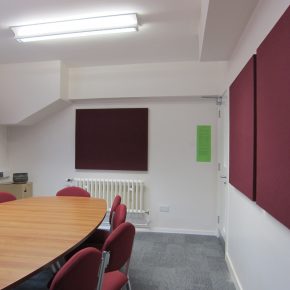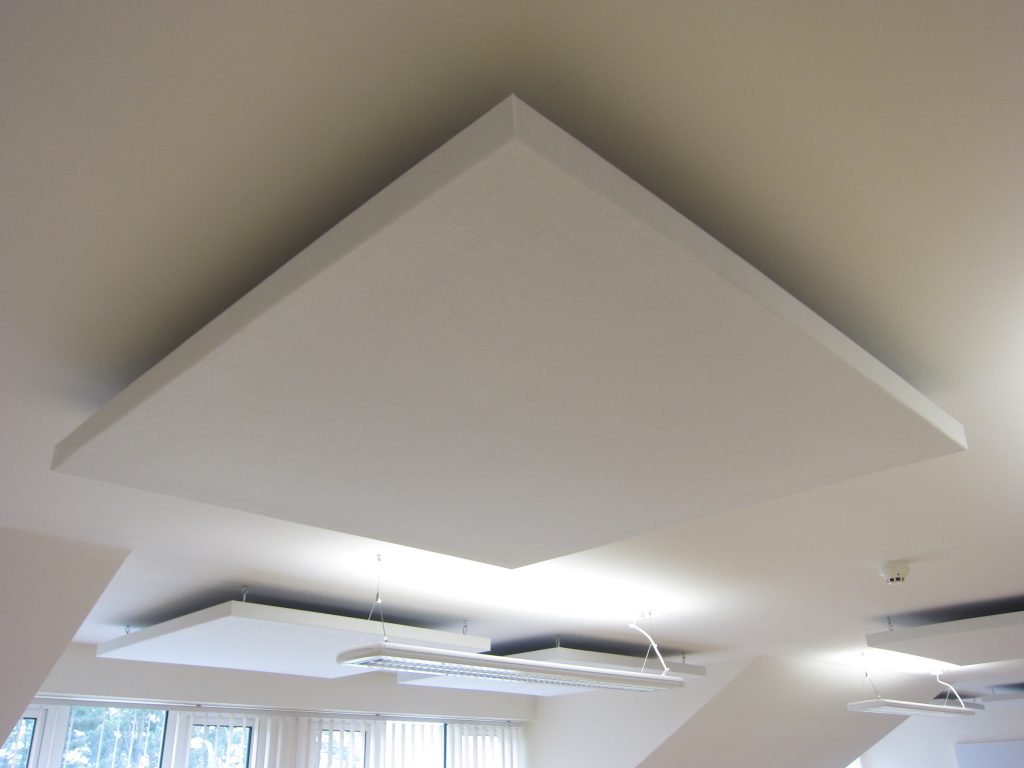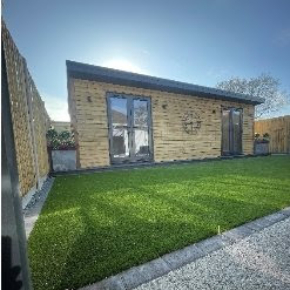
Hush: How to improve acoustics inside our commercial and public buildings
Whether you are in a busy restaurant where you struggle to hear yourself speak, an echoey sports hall or a meeting room where it is difficult to make out what others are saying, there are so many buildings that are hindered by poor acoustics. Ambient noise or background noise can reach levels where it undermines the whole purpose of the room itself. And the reasons for this are usually to do with sound reverberation – something that can be addressed relatively easily using today’s advanced sound absorption solutions, as Hush explains…
What is sound reverberation and why does it become a problem?
When sound waves hit the various surfaces with a room, they are both absorbed and reflected to different extents depending on the type of material. Hard surfaces will mostly reflect sound back into the room, whereas softer materials are likely to absorb the sound waves, which includes converting some of their energy into heat.
The effect of this reflection can be a clear and distinguishable echo (at longer distances away from the surface) or – much more likely – what we call sound reverberation. This is the ‘superposition’ (cacophony) of reflected sound waves which causes excessive background noise in busy rooms and makes it difficult to hear just a single voice in certain situations.
Reverberation is a major problem inside schools, workplaces, hospitality venues and public buildings because of the materials that we often use in their construction, fit-out and décor. Many historic buildings such as churches and museums were, of course, built using hard materials including stone, brick and tiles, but in today’s architecture we continue to build this way along with more glass, concrete and timber.
In many interior spaces, out has gone soft furnishings, curtains and carpets, and in has come exposed concrete and services, laminate floors and large expanses of glazing to maximise natural daylight. In environments of this kind, there is virtually nowhere for any sound waves to be absorbed – so they just bounce off surfaces back into the room.
How to reduce sound reverberation in rooms
The solution is relatively simple – reduce the extent of hard, reflective surfaces. You could start by adding softer furnishings, but this would inevitably compromise other goals. Carpets, for example, will not provide the long lifespan and low maintenance benefits of a wooden floor, and curtains may affect the aesthetics of the room and the appearance being sought.
A more effective and passive solution is to install sound absorbers appropriately in affected rooms. This starts with a site survey by an acoustics specialist from Hush Acoustics, who will gather the necessary information to carry out a series of reverberation calculations. This will determine how and where sound absorbers could be used to control reduce reverberation, echo and ambient noise.
The solution is often to install Hush Absorber panels to walls and/or ceilings, perhaps in the form of baffles hanging from the ceiling. Every solution is tailored to the affected room – no two rooms will ever have exactly the same requirements, but the overall result should be the same given Hush Acoustics’ expertise in this area.
What are sound absorber panels?
Hush Acoustics provides a range of sound absorber products which are manufactured from thick acoustic foam hand finished with fabric applied to the face, edges and back return. These are available in two performance classifications – the Hush Absorber 50 and Hush Baffles, which are Class A products, and the Class C rated Hush Absorber 30.
Class A products provide the highest level of absorption but not every application will require this – in which case Hush Absorber 30 is perfect. Fire safety can be optimised too with a fabric cover option available with Class 1 to Class 0 flame retardant performance.
Hush Absorber 50, 50a and 30 are designed to be fitted on any alignment and angle including slopes and ceilings in both portrait and landscape. With stylish and visually pleasing designs available in a choice of sizes, colours and finishes, the absorbers can be specified to be an attractive feature for the room, in place of art or wall graphics for example, or to go virtually unnoticed. Hush Baffles will hang from ceilings which can make for an interesting visual feature in any room.

Get an estimate of your acoustic absorber requirements online
Hush Acoustics offers a useful online tool to provide an initial estimate of what sound absorber products would work best for a property. The Hush Acoustic Estimator allows building owners to enter the dimensions of their room, along with details about the extent of windows and type of walls, floors, ceilings and doors, to generate an outline proposal.
Where can sound absorbers make a difference?
Over the past three decades, Hush Acoustics has been tasked with improving the acoustic conditions in countless internal environments. In our experience reverberation can be an issue virtually anywhere, but school halls, village halls, classrooms, lecture theatres, meeting rooms and open plan offices top the list of problem areas.
Even the newest of buildings can be treated effectively, with hassle-free installation causing minimal disruption during the working day.
Perfect for improving educational environments
One application where reverberation can cause a particular problem is in schools, colleges and universities. Studies around the world have shown that excessive ambient noise combined with poor speech intelligibility can be highly damaging to learning due to the distraction and lack of engagement that results.
Amongst the educational environments that have benefitted from Hush Absorbers is Walsall College, one of the West Midlands’ largest providers of qualifications for 14- to 19-year-olds and vocational education.
Its main Wisemore Campus includes learning pods and boardroom that feature many hard interior surfaces such as plastered walls, glazed partitions, large windows and carpet-tiled floors. Despite being integral to creating a visually appealing, energy efficient, safe, secure and comfortable learning environment, these materials were also hindering the acoustic conditions within these spaces.
The college invited Hush Acoustics to help, and the results have been transformative. Core to the solution were Hush Absorber 50 panels installed to the ceilings and walls – read the full case study here.
Find out more
If you would like any assistance or advice to improve the acoustics within your building or individual rooms, Hush Acoustics would be delighted to helps and perhaps conduct a free site survey.
Hush Acoustics Ltd
Unit 2, Tinsley Industrial Estate
Shepcote Way
Sheffield
South Yorkshire
S9 1TH
Tel: 0114 551 8685
Fax: 0151 944 1146
Visit Supplier's page
Latest news

29th April 2025
Senior pledges to ‘bee’ part of the solution with new biodiversity initiative
Senior Architectural Systems has installed its first on-site beehive, marking another step forward in its commitment to sustainability and biodiversity.
Posted in Articles, Building Industry News, Building Products & Structures, Building Services, Curtain Walling, Doors, Glass, Glazing, Innovations & New Products, news, Restoration & Refurbishment, Retrofit & Renovation, Sustainability & Energy Efficiency, Walls, Windows
29th April 2025
West Fraser range delivering key benefits for South-East carpentry company
An experienced carpenter and building site manager who has recently set up his own company is using high performance panel products from the West Fraser range.
Posted in Articles, Building Industry News, Building Products & Structures, Building Systems, Case Studies, Garden, Restoration & Refurbishment, Retrofit & Renovation, Sustainability & Energy Efficiency, Timber Buildings and Timber Products
29th April 2025
CPD Courses Available Online From Ecological Building Systems
Ecological Building Systems, a leading supplier of natural building products for sustainable construction, has revealed its comprehensive CPD programme for the year ahead.
Posted in Articles, Building Industry Events, Building Industry News, Building Products & Structures, Building Services, Continuing Professional Development (CPD's), Information Technology, Innovations & New Products, Insulation, Restoration & Refurbishment, Retrofit & Renovation, Seminars, Sustainability & Energy Efficiency, Training, Walls, Waste Management & Recycling
29th April 2025
WindowBASE launches new prospect databases at FIT Show
Visit WindowBASE at the FIT Show to see first-hand how it helps companies find new customers – the company is launching an easy-to-use, intuitive platform on Stand G16 at the NEC Birmingham from 29th April – 1st May.
Posted in Articles, Building Industry Events, Building Industry News, Building Products & Structures, Building Services, Doors, Exhibitions and Conferences, Glass, Glazing, Information Technology, Innovations & New Products, Posts, Publications, Research & Materials Testing, Restoration & Refurbishment, Retrofit & Renovation, Windows
 Sign up:
Sign up: